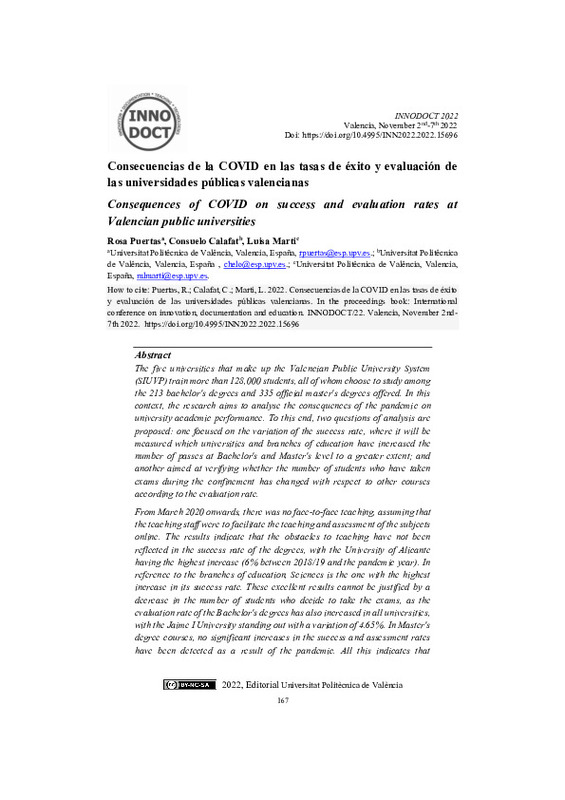|
Resumen:
|
[ES] Las cinco universidades que conforman el Sistema Público Universitario Valenciano (SIUVP) forman a más de 128.000 alumnos, todos ellos deciden estudiar entre los 213 grados y 335 másteres oficiales ofertados. En este ...[+]
[ES] Las cinco universidades que conforman el Sistema Público Universitario Valenciano (SIUVP) forman a más de 128.000 alumnos, todos ellos deciden estudiar entre los 213 grados y 335 másteres oficiales ofertados. En este contexto, la investigación tiene como objetivo analizar las consecuencias de la pandemia en el rendimiento académico universitario. Para ello, se plantean dos cuestiones de análisis: una enfocada a la variación de la tasa éxito donde se medirá qué universidades y ramas de enseñanza han incrementado en mayor medida los aprobados a nivel de grado y máster; y otra dirigida a verificar si la cantidad de alumnos que se han presentado a los exámenes durante el confinamiento se ha modificado respecto otros cursos según la tasa de evaluación. A partir de marzo de 2020 no hubo docencia presencial, suponiendo que el profesorado debía facilitar la docencia y la evaluación de las asignaturas de forma online. Los resultados indican que los obstáculos para impartir la enseñanza no se han visto reflejados en la tasa de éxito de los grados, llegando a tener la Universidad de Alicante el máximo incremento (6% entre 2018/19 y el curso de la pandemia). En referencia a las ramas de enseñanza son las Ciencias las que presenta mayor subida en su tasa de éxito. Estos óptimos resultados no pueden justificarse por una disminución en la cantidad de alumnos que decide presentarse a las pruebas, ya que la tasa de evaluación de los grados también ha crecido en todas las universidades, destacando la Universidad Jaime I con una variación del 4.65%. En los estudios de máster no se detecta incrementos significativos de la tasa de éxito y de evaluación como consecuencia de la pandemia. Todo ello indica que los estudiantes de posgrado han seguido una pauta de conducta totalmente distinta a los del grado.
[-]
[EN] The five universities that make up the Valencian Public University System (SIUVP) train more than 128,000 students, all of whom choose to study among the 213 bachelor's degrees and 335 official master's degrees offered. ...[+]
[EN] The five universities that make up the Valencian Public University System (SIUVP) train more than 128,000 students, all of whom choose to study among the 213 bachelor's degrees and 335 official master's degrees offered. In this context, the research aims to analyse the consequences of the pandemic on university academic performance. To this end, two questions of analysis are proposed: one focused on the variation of the success rate, where it will be measured which universities and branches of education have increased the number of passes at Bachelor's and Master's level to a greater extent; and another aimed at verifying whether the number of students who have taken exams during the confinement has changed with respect to other courses according to the evaluation rate. From March 2020 onwards, there was no face-to-face teaching, assuming that the teaching staff were to facilitate the teaching and assessment of the subjects online. The results indicate that the obstacles to teaching have not been reflected in the success rate of the degrees, with the University of Alicante having the highest increase (6% between 2018/19 and the pandemic year). In reference to the branches of education, Sciences is the one with the highest increase in its success rate. These excellent results cannot be justified by a decrease in the number of students who decide to take the exams, as the evaluation rate of the Bachelor's degrees has also increased in all universities, with the Jaime I University standing out with a variation of 4.65%. In Master's degree courses, no significant increases in the success and assessment rates have been detected as a result of the pandemic. All this indicates that postgraduate students have followed a completely different pattern of behaviour to undergraduate students.
[-]
|









